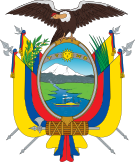| ||||||||||||||||||||||
| Do you agree that, in order to hold a position of popular election or to be a public servant, it is established as a prohibition to have assets or capital, of any nature, in tax havens? | ||||||||||||||||||||||
| Results | ||||||||||||||||||||||
|---|---|---|---|---|---|---|---|---|---|---|---|---|---|---|---|---|---|---|---|---|---|---|
| ||||||||||||||||||||||
| Politics of Ecuador |
|---|
 |
| Constitution |
| Executive |
| Legislative |
| Judiciary |
Elections
|
| Administrative divisions |
Foreign relations
|
|
|
A referendum on banning politicians and civil servants from having bank accounts or companies based in tax havens was held in Ecuador on 19 February 2017, alongside general elections. The proposal was approved by voters, giving officials one year to transfer their assets or be removed from their posts.
The question on the ballot was "Do you agree that, for those holding a popularly elected office or for public servants, there should be a prohibition on holding assets or capital, of any nature, in tax havens?"
Classification of tax havens
In preparation for the referendum, the Ecuadorian Internal Revenue Service issued a resolution outlining the criteria for a jurisdiction to be considered a tax haven, establishing two categories: Preferential tax regimes, and low tax jurisdictions. A preferential tax regime was classed as a jurisdiction whose effective tax rate is below 60% in relation to the Ecuadorian corporate income tax (CIT) rate of 13.2%. A low tax jurisdiction was classed as having an effective tax rate below 60% in relation to the Ecuadorian CIT of 13.2% and no substantial economic activity. The IRS may remove a country from their list of tax havens if it reforms its tax policy, if it enforces a treaty to avoid double taxation, including a special information exchange clause, or if its laws do not include banking confidentiality, securities or other regulations that prohibit sharing information with the Ecuadorian IRS.
Along with this definition, the Ecuadorian IRS published a list of countries which currently meet the definition of a tax haven under their law. This list included 28 jurisdictions in the Americas, 19 in Oceania, 16 in Europe, 13 in Asia, 9 in Africa and two other island territories.
Campaign
Outgoing President Rafael Correa stated that he would campaign in favour of the proposal, having previously stated that tax havens were one of the biggest issues for democracy.
Results
| Choice | Votes | % |
|---|---|---|
| Yes | 5,030,579 | 55.12 |
| No | 4,096,559 | 44.88 |
| Invalid/blank votes | 1,336,496 | – |
| Total | 10,472,302 | 100 |
| Registered voters/turnout | 12,816,698 | 81.64 |
| Source: CNE Archived 2020-09-25 at the Wayback Machine | ||
Notes
- ^ British Overseas Territory
- ^ Part of the
 Kingdom of the Netherlands
Kingdom of the Netherlands
- ^
 United States unincorporated territory
United States unincorporated territory
- ^ Overseas Collectivity of
 France
France
- ^
 British Dependency
British Dependency
- External Territory of
 Australia
Australia
- ^ Free Association with
 New Zealand
New Zealand
- Free Association with the United States
- Dependent territory of New Zealand
References
- Referendum on tax havens will be conducted in the elections of 2017 Archived 2016-12-24 at the Wayback Machine Ecuador Times, 22 November 2016
- Ecuador Revives Campaign for UN Tax Body IPS News, 27 January 2017
- Republic of Ecuador: Referendum IFES
- ^ Ecuadorian IRS issues resolution with new list of tax haven jurisdictions Archived 2017-02-23 at the Wayback Machine EY, 9 February 2015
- President Correa: tax havens are one of the biggest problems in our democracies Andes, 29 July 2016
| Presidential elections | |
|---|---|
| Parliamentary elections | |
| CPCCS elections | |
| Local elections | |
| Referendums | |